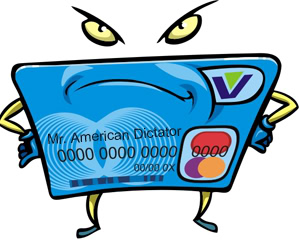 You probably already know that not paying a bill can adversely affect your credit score, but do you know by about how much? Do you know what effect opening up a retailer charge card just to get 10% off on your purchase can have on your credit score? These are some things you should be aware of. Here are 5 tips that will help you understand how certain decisions can affect your credit score and what you can do to maximize your score.
You probably already know that not paying a bill can adversely affect your credit score, but do you know by about how much? Do you know what effect opening up a retailer charge card just to get 10% off on your purchase can have on your credit score? These are some things you should be aware of. Here are 5 tips that will help you understand how certain decisions can affect your credit score and what you can do to maximize your score.
 Pay Your Bills on Time. Even if you can only make minimum payments, that’s better than being late with a bill because late payments of 30 days or more can drop your FICO score by 50 points or more. If you suffer from “Financial Deficit Disorder” and just can’t seem to get your bills paid on time, try setting up automatic bill pay.
Pay Your Bills on Time. Even if you can only make minimum payments, that’s better than being late with a bill because late payments of 30 days or more can drop your FICO score by 50 points or more. If you suffer from “Financial Deficit Disorder” and just can’t seem to get your bills paid on time, try setting up automatic bill pay.
 Don’t Max Out Your Credit Cards. Since your credit score factors in your debt to credit ratio, try to keep your balances to no more than 30% of your available credit limit. For instance, if you have a card with a $10,000 credit line, make sure you don’t carry a balance of more than $3,000 on that card. If you can pay off your credit cards each month, that’s even better. But if you can’t, it’s better to spread out debt over a few cards, to maintain lower balances, rather than max out any one card.
Don’t Max Out Your Credit Cards. Since your credit score factors in your debt to credit ratio, try to keep your balances to no more than 30% of your available credit limit. For instance, if you have a card with a $10,000 credit line, make sure you don’t carry a balance of more than $3,000 on that card. If you can pay off your credit cards each month, that’s even better. But if you can’t, it’s better to spread out debt over a few cards, to maintain lower balances, rather than max out any one card.
 Keep Older, Established Accounts Open. It feels good to pay off a credit card and finally get that statement showing a zero balance. However, if you pay off a creditor, don’t make the mistake of closing that account because 15% of your FICO score is based on the length of your credit history. The longer a credit history you have, the better it is for your score.
Keep Older, Established Accounts Open. It feels good to pay off a credit card and finally get that statement showing a zero balance. However, if you pay off a creditor, don’t make the mistake of closing that account because 15% of your FICO score is based on the length of your credit history. The longer a credit history you have, the better it is for your score.
 Avoid “Bad” Forms of Credit. I’m sure you’ve walked into a department store and been offered 10% off, or some other discount, just for opening up a credit card with that retailer, right? Did you take the bait? If so, realize that you might have hurt your credit score. Here’s why. The FICO scoring model rates some forms of credit more favorably than others. For instance, the presence of a mortgage on your credit report will help your score, but too many consumer finance cards (i.e., the cards issued by department stores and retailers) can hurt it. For this reason, do yourself a favor and say “No” to those credit card offers from stores you patronize. Just use a major credit card — like a Visa, MasterCard, American Express, or Discover Card — if you need to use credit to make your purchases.
Avoid “Bad” Forms of Credit. I’m sure you’ve walked into a department store and been offered 10% off, or some other discount, just for opening up a credit card with that retailer, right? Did you take the bait? If so, realize that you might have hurt your credit score. Here’s why. The FICO scoring model rates some forms of credit more favorably than others. For instance, the presence of a mortgage on your credit report will help your score, but too many consumer finance cards (i.e., the cards issued by department stores and retailers) can hurt it. For this reason, do yourself a favor and say “No” to those credit card offers from stores you patronize. Just use a major credit card — like a Visa, MasterCard, American Express, or Discover Card — if you need to use credit to make your purchases.
 Only Apply for Credit When You Truly Need It. Just because you get a pre-approved offer in the mail, or some telemarketer calls you to solicit for a credit card, doesn’t mean you should accept it. You should only seek out credit when you absolutely need it because taking on too much new credit – or even just applying for it – will lower your credit score. Each time you apply for a loan, whether it is a credit card, an auto loan, a mortgage, or a student loan, the lender pulls your credit report and generates an “inquiry” on your credit file. That inquiry remains there for two years. A single inquiry can lower your FICO score by up as much as 35 points.
Only Apply for Credit When You Truly Need It. Just because you get a pre-approved offer in the mail, or some telemarketer calls you to solicit for a credit card, doesn’t mean you should accept it. You should only seek out credit when you absolutely need it because taking on too much new credit – or even just applying for it – will lower your credit score. Each time you apply for a loan, whether it is a credit card, an auto loan, a mortgage, or a student loan, the lender pulls your credit report and generates an “inquiry” on your credit file. That inquiry remains there for two years. A single inquiry can lower your FICO score by up as much as 35 points.
A longer version of this post appeared yesterday on Gwyneth Paltrow’s blog, as “Top 10 Tips for Saving Money and Investing Wisely.” Read it and my other tips to her readers here.








You must be logged in to post a comment.